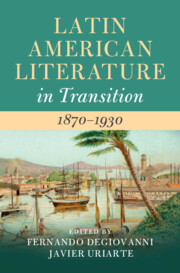Book contents
- Latin American Literature in Transition 1870–1930
- Latin American Literature in Transition
- Latin American Literature in Transition 1870–1930
- Copyright page
- Contents
- Figures
- Contributors
- Acknowledgments
- Introduction
- Part I Commodities
- Chapter 1 Rubber
- Chapter 2 Guano and Nitrates
- Chapter 3 Coffee
- Chapter 4 Plantains and Bananas
- Chapter 5 Sugar
- Chapter 6 Yerba
- Part II Networks
- Part III Uprisings
- Part IV Connectors
- Part V Cities
- Index
- References
Chapter 2 - Guano and Nitrates
from Part I - Commodities
Published online by Cambridge University Press: 14 January 2023
- Latin American Literature in Transition 1870–1930
- Latin American Literature in Transition
- Latin American Literature in Transition 1870–1930
- Copyright page
- Contents
- Figures
- Contributors
- Acknowledgments
- Introduction
- Part I Commodities
- Chapter 1 Rubber
- Chapter 2 Guano and Nitrates
- Chapter 3 Coffee
- Chapter 4 Plantains and Bananas
- Chapter 5 Sugar
- Chapter 6 Yerba
- Part II Networks
- Part III Uprisings
- Part IV Connectors
- Part V Cities
- Index
- References
Summary
Exports of the agricultural fertilizers guano and nitrates spurred bursts of economic euphoria and decline on South America’s Pacific coast, first in Peru and then in Chile. This chapter analyzes fiction and economic essays from Peru’s guano era (1840s–1870s) and Chile’s nitrate era (1880s–1920s). In both contexts, intellectuals voiced concerns that the financial abundance brought by fertilizer exports would reveal itself to be “fictitious prosperity,” both ecologically and economically unsustainable. These anxieties, moreover, infuse novels that dramatize urban elite society in times of fertilizer-driven abundance: Benjamín Cisneros’s Julia (Peru, 1861) and Luis Orrego Luco’s Casa grande (Chile, 1908). By tracing shared tropes across literary genre as well as temporal and national context, the chapter illustrates how elites expressed concerns about economic booms marked by debt, financial speculation, and the export of a single, exhaustible natural resource.
Keywords
- Type
- Chapter
- Information
- Latin American Literature in Transition 1870–1930 , pp. 30 - 43Publisher: Cambridge University PressPrint publication year: 2022

